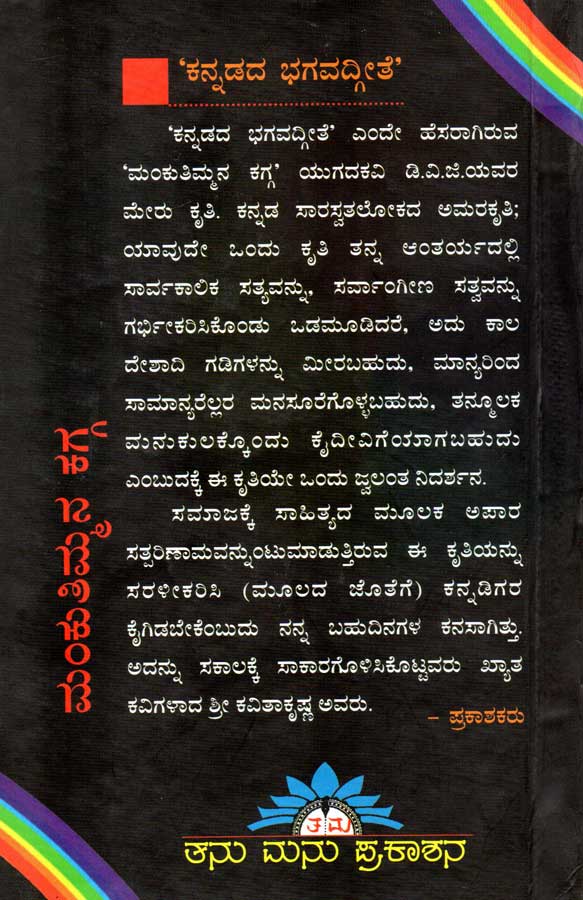
Sources for studying Kagga Some other kaggas Thimmaguruvina Darshana By Prof. There is also Marula Muniyana Kagga which is considered as the practical extension of Mankuthimmana Kagga Significance Manku Thimmana Kagga explores the complexity of life, the various aspects of life - in a simple set of striking words. The poem explains in simple poetic images one of the messages of the Bhagavad Gita: samatwam, or balance in life (SAMATWAM YOGA UCCHATE). In these four short lines, this poem teaches us the secret of leading a balanced and harmonius life, emphasizing gentleness, humbleness, compassion on the one hand and strength on the other hand. In the last line, this poem tells us to lead a harmonious life by becoming one with all people. Do all you can to help the poor and the needy. Be strong, yet be compassionate to the poor, weak and down-trodden.


Be gentle and send your fragrance in all directions like the jasmine flower, but also learn to face the difficulties like a rock. Become a solid rock and face all the difficulties in life. But, when fate brings its share of difficulties, be ready to face them like a rock. This poem says, do not always stand firm like a proud, tall tree, but bend like a gentle blade of grass when the winds blow.
#DVG MANKUTIMMANA KAGGA POEMS HOW TO#
Thus this song imparts to us one of the secrets of life, which lies in learning how to survive by understanding the humbleness of the gentle blade of grass. The tall trees are "too proud" to bend and surrender to the winds, whereas the humble blade of grass will bend and surrender to the mighty wind. When the rain pours over the mountains, when the mighty winds blow, the tall trees on the mountains may fall down, but the gentle blade of grass will bend and survive. The metaphor of gentle blade of grass at the foot of the mountain is very profound. The song says, be humble like a blade of grass at the foot of the mountain and spread your fragrance like a gentle jasmine flower. It advises us to be humble and gentle yet strong.

This short and beautiful poem holds the key for leading a balanced life. be a (gentle) blade of grass at the foot of the mountain and jasmine flower at home Be (strong) like a rock when fate pours (torrential) rains of difficulties on you Be sweet like sugar and jaggery to the poor and weak Be one with all, Mankuthimma. The Spirit of Kagga One of the popular poems from this work, "Hullagu bettadadi", translated below, conveys the spirit of Kagga. Kagga is very popular in Kannada literature, and most native Kannada speakers are familiar with at least a few of the poems from this important work. The message of many of the verses from Kagga is "samatwa". Thus, Kagga advises us to follow the middle path while extending one hand towards the Ultimate Truth and the other hand to the phenomenal world. Shetty 4.5 Mankutimmana Kagga - Notable commentaries 5 See also 6 References 7 External links Popularity Kagga explores deeper questions of life, contemplates on the meaning of the Ultimate Truth (reality) and advises us to lead a balanced life in this complex and ever-changing world. DVG's Mankuthimmana Kagga - An English Transcreation by Dr. ] Contents 1 Popularity 2 The Spirit of Kagga 3 Significance 4 Sources for studying Kagga 4.1 Thimmaguruvina Darshana 4.2 Kaggakkondu Kaipidi 4.3 Thus Sang Mankuthimma 4.4 Dr. The poet politely that if the word Mankuthimma is crude and below standard it can be substituted by either Venka or Kanka or Shankararya as they please. Though the author calls it an 'afoggy fools forrago', it is a book giving expression to a noble personality's rich experiences. Kagga poems are profound as well as poetic. Some of these poems are written in old Kannada style (halegannada). Kagga is a collection of 945 poems, each being four lines in length. The title of this work can be translated as "Dull Thimma's Rigmarole". It is widely regarded as a masterpiece among the Kannada speaking population of southern India, and is referred to as the Bhagavad Gita in Kannada. Gundappa (known by the name D V G) and published in 1943, is one of the best known of the major literary works in Kannada. Mankuthimmana Kagga - Modern BHGAVAD GITA:


 0 kommentar(er)
0 kommentar(er)
